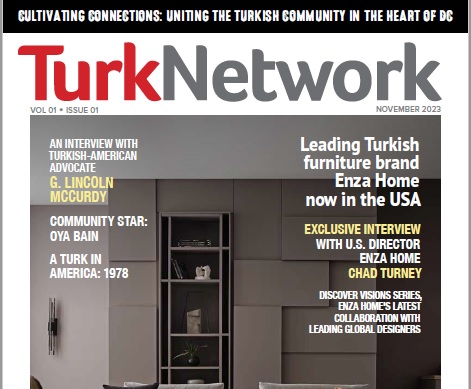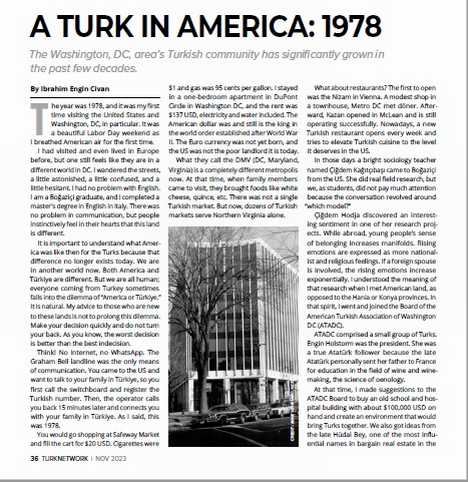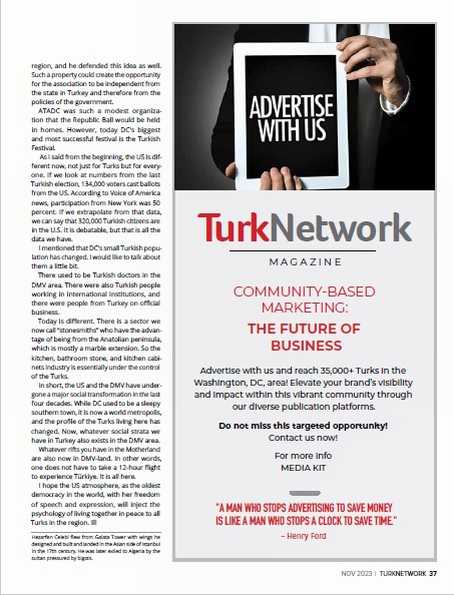The Washington, DC, area’s Turkish community has significantly grown in the past few decades.
By Ibrahim Engin Civan
The year was 1978, and it was my first time visiting the United States and Washington, DC, in particular. It was a beautiful Labor Day weekend as I breathed American air for the first time. I had visited and even lived in Europe before, but one still feels like they are in a different world in DC. I wandered the streets, a little astonished, a little confused, and a
little hesitant. I had no problem with English. I am a Boğaziçi graduate, and I completed a
master's degree in English in Italy. There was no problem in communication, but people
instinctively feel in their hearts that this land is different.
It is important to understand what America was like then for the Turks because that difference no longer exists today. We are in another world now. Both America and Türkiye are different. But we are all human; everyone coming from Turkey sometimes falls into the dilemma of “America or Türkiye.” It is natural. My advice to those who are new to these lands is not to prolong this dilemma. Make your decision quickly and do not turn your back. As you know, the worst decision is better than the best indecision.
Think! No Internet, no WhatsApp. The Graham Bell landline was the only means of communication. You came to the US and want to talk to your family in Türkiye, so you first call the switchboard and register the Turkish number. Then, the operator calls you back 15 minutes later and connects you with your family in Türkiye. As I said, this was 1978.
You would go shopping at Safeway Market and fill the cart for $20 USD. Cigarettes were $1 and gas was 95 cents per gallon. I stayed in a one-bedroom apartment in DuPont Circle in Washington DC, and the rent was $137 USD, electricity and water included. The American dollar was and still is the king in the world order established after World War II. The Euro currency was not yet born, and the US was not the poor landlord it is today.
What they call the DMV (DC, Maryland, Virginia) is a completely different metropolis now.
At that time, when family members came to visit, they brought foods like white cheese, quince, etc. There was not a single Turkish market. But now, dozens of Turkish markets serve Northern Virginia alone.
What about restaurants? The first to open was the Nizam in Vienna. A modest shop in
a townhouse, Metro DC met döner. Afterward, Kazan opened in McLean and is still operating successfully. Nowadays, a new Turkish restaurant opens every week and
tries to elevate Turkish cuisine to the level it deserves in the US. In those days a bright sociology teacher named Çiğdem Kağıtçıbaşı came to Boğaziçi from the US.
She did real field research, but we, as students, did not pay much attention because the conversation revolved around “which model?”
Çiğdem Hodja discovered an interesting sentiment in one of her research projects. While abroad, young people’s sense of belonging increases manifolds. Rising emotions are expressed as more nationalist and religious feelings. If a foreign spouse is involved, the rising emotions increase exponentially. I understood the meaning of that research when I met American land, as opposed to the Hania or Konya provinces. In that spirit, I went and joined the Board of the American Turkish Association of Washington DC (ATADC).
ATADC comprised a small group of Turks. Engin Holstorm was the president. She was a true Atatürk follower because the late Atatürk personally sent her father to France for education in the field of wine and winemaking, the science of oenology.
At that time, I made suggestions to the ATADC Board to buy an old school and hospital building with about $100,000 USD on hand and create an environment that would bring Turks together. We also got ideas from the late Hüdai Bey, one of the most influential
names in bargain real estate in the region, and he defended this idea as well.
Such a property could create the opportunity for the association to be independent from
the state in Turkey and therefore from the policies of the government.
ATADC was such a modest organization that the Republic Ball would be held in homes. However, today DC's biggest and most successful festival is the Turkish Festival.
As I said from the beginning, the US is different now, not just for Turks but for everyone. If we look at numbers from the last Turkish election, 134,000 voters cast ballots from the US. According to Voice of America news, participation from New York was 50 percent. If we extrapolate from that data, we can say that 320,000 Turkish citizens are in the U.S. It is debatable, but that is all the data we have.
I mentioned that DC’s small Turkish population has changed. I would like to talk about them a little bit.
There used to be Turkish doctors in the DMV area. There were also Turkish people working in international institutions, and there were people from Turkey on official business.
Today is different. There is a sector we now call “stonesmiths” who have the advantage of being from the Anatolian peninsula, which is mostly a marble extension. So the kitchen, bathroom stone, and kitchen cabinets industry is essentially under the control of the Turks.
In short, the US and the DMV have undergone a major social transformation in the last four decades. While DC used to be a sleepy southern town, it is now a world metropolis, and the profile of the Turks living here has changed. Now, whatever social strata we have in Turkey also exists in the DMV area.
Whatever rifts you have in the Motherland are also now in DMV-land. In other words, one does not have to take a 12-hour flight to experience Türkiye. It is all here.
I hope the US atmosphere, as the oldest democracy in the world, with her freedom of speech and expression, will inject the psychology of living together in peace to all Turks in the region.
*Hezarfen Celebi flew from Galata Tower with wings he designed and built and landed in the Asian side of Istanbul in the 17th century. He was later exiled to Algeria by the
sultan pressured by bigots.




YORUMLAR